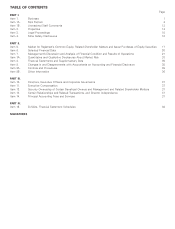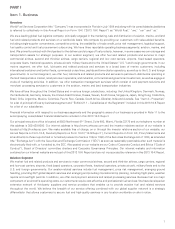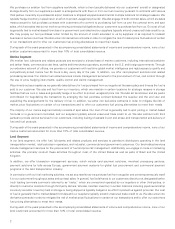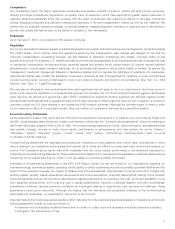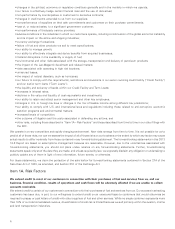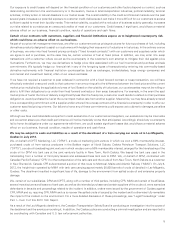World Fuel Services 2013 Annual Report Download - page 15
Download and view the complete annual report
Please find page 15 of the 2013 World Fuel Services annual report below. You can navigate through the pages in the report by either clicking on the pages listed below, or by using the keyword search tool below to find specific information within the annual report.Adverse conditions in the aviation, marine and land transportation industries may have an adverse effect on our
business.
Our business is focused on the marketing of fuel and other related products and services to the aviation, marine and land
transportation industries, which are generally affected by economic cycles. Therefore, weak economic conditions can have a negative
impact on the business of our customers which may, in turn, have an adverse effect on our business. In addition, any political
instability, natural disasters, terrorist activity or military action that disrupts shipping, flight operations or land transportation will
adversely affect our customers and may reduce the demand for our products and services. Our business could also be adversely
affected by increased merger activity in the aviation, marine or land transportation industries, which may reduce the number of
customers that purchase our products and services, as well as the prices we are able to charge for such products and services.
In addition, the aviation, marine and land transportation industries are subject to continuing changes in laws and regulations, including
environmental regulations mandating or incentivizing alternative energy sources or attempting to control or limit emissions and
pollution. For example, recent amendments to the International Convention for the Prevention of Pollution from Ships, or MARPOL,
established a phased reduction of the sulfur content in fuel oil and allows for stricter sulfur limits in designated emission control areas.
Further changes in laws and regulations applicable to international and national maritime trade are expected over the coming years.
Complying with these and other laws and regulations may require capital expenditures by our customers or otherwise increase our
customers’ operating costs, which could in turn, reduce the demand for our products and services. Although the ultimate impact of
any regulations is difficult to predict accurately, they could have a material adverse effect on our business or on the businesses of our
customers.
If the fuel and other products we purchase from our suppliers fails to meet the contractual specifications we have
agreed to supply to our customers, our business could be adversely affected.
We purchase fuel and other products from suppliers and resell to customers. If the fuel and other products we sell fails to meet the
specifications we have agreed to with customers, we could incur significant liabilities if a customer initiates a claim or a lawsuit for
which we settle or results in a decision against us. In addition, our relationship with our customers could be adversely affected and
adverse publicity about any allegations of contaminated products may negatively affect us, regardless of whether the allegations are
true. Although in most cases we have recourse against our suppliers for products that fail to meet contractual specifications, such
recourse cannot be assured and may be costly to enforce. For example, several of our supply agreements are with foreign entities,
including foreign governments, and are governed by the laws of foreign jurisdictions. If a supplier breaches such agreement, then we
may incur the additional costs of determining our rights and obligations under the agreement, under applicable foreign laws, and
enforcing an agreement in a foreign jurisdiction. Any significant liability in excess of any applicable insurance coverage could have a
material adverse effect on our business, financial condition, results of operations and cash flows.
Changes in the market price of fuel may have a material adverse effect on our business.
Fuel prices have been extremely volatile in the past, may be volatile in the future and depend on factors outside of our control, such as:
• global economic conditions;
• changes in global crude oil and natural gas prices;
• expected and actual supply and demand for fuel;
• political conditions;
• laws and regulations related to environmental matters, including those mandating or incentivizing alternative energy sources or
otherwise addressing global climate change;
• changes in pricing or production controls by various organizations and oil producing countries;
• technological advances affecting energy consumption or supply;
• energy conservation efforts;
• price and availability of alternative fuels; and
• weather.
As fuel prices increase, our customers may not be able to purchase as much fuel from us because of their credit limits with us and the
resulting adverse impact on their business could cause them to be unable to make payments owed to us for fuel purchased on credit.
They may also choose to reduce the amount of fuel they consume in their operations in order to reduce costs or comply with new
environmental regulations to obtain associated incentives. For example, in the shipping industry an increasing number of container ships
are sailing at reduced speeds, known as ‘‘slow-steaming,’’ in order to conserve fuel and reduce carbon emissions. In any such event,
there can be no assurance that the volume of orders from our customers will increase again or that we will be able to replace lost volumes
with new customers. In addition, if fuel prices increase, our own credit limits could prevent us from purchasing enough fuel from our
suppliers to meet our customers’ demands or could require us to prepay for fuel purchases which would impair our liquidity.
9


